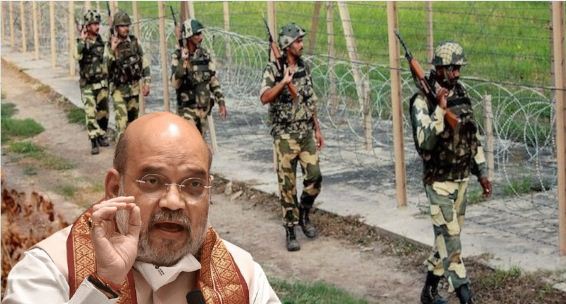Modi government through a gazette notification on Monday decided to grant more power to Border Security Force (BSF) by extending its jurisdiction across three states along the national borders, namely- Punjab, West Bengal, and Assam. The Ministry of Home Affairs announced that BSF’s jurisdiction will increase from 15 km to 50 km inside the international border to “improve operational efficiency” and “crack down on smuggling rackets”.
Moreover, the Central Government has revised the ‘Schedule’ specifying the border stretch where BSF would have powers of search, seizure, and arrest under Acts like Passport Act, NDPS Act, Customs Act, etc as well as Criminal Procedure Code (CrPC) to the states of Manipur, Mizoram, Nagaland, Tripura, and Meghalaya; UTs of J&K and Ladakh; and 50 km-belt in Gujarat, Rajasthan, Punjab, West Bengal and Assam.
In a statement, the BSF said, “The amendment effected on October 11 establishes uniformity in defining the area within which Border Security Force can operate as per its charter of duties and execution of its role and task of border guarding in its areas of deployment.”
Shoring up the defences
The idea behind shoring up defences of Punjab and West Bengal, in particular, is pretty straightforward. The former is a haven for drug peddlers to move the contraband around meanwhile the latter has seen a mass influx of illegal refugees over the years that have conveniently been legitimized by the Mamata government in exchange for the precious electorate votes, without taking into consideration the strain it puts on the country’s resources.
Moreover, the refugees, in absence of employment and educational opportunities inadvertently mix up with the bad crew, and become a menace to the public.
As per media reports, the BSF officials have said that trans-border crimes will be prevented through this new move of the central government. They have also said that this will bring uniformity to BSF operations that are conducted in border states.
Usual suspects protesting against the decision
As usual, the majority of rancour against the decision came from Punjab and West Bengal only. Following the footsteps of his master Navjot Singh Sidhu who has strong connections with the political brass of Pakistan, CM Charanjit Singh Channi protested against the move.
He took to Twitter to share his anger, “I strongly condemn the government of India`s unilateral decision to give additional powers to BSF within 50 km belt running along the international borders, which is a direct attack on federalism. I urge Union Home Minister Amit Shah to immediately roll back this irrational decision.”
Meanwhile, West Bengal Transport Minister and TMC leader Firhad Hakim remarked, “The Central Government is violating the federal structure of the country. Law and order is a state subject but the Central Government is trying to interfere through central agencies.”
As a matter of fact, in the recent past, Banerjee and her government have made no secret of the fact that she wants BSF’s powers and jurisdiction curbed. Before the assembly elections, Hakim had levelled baseless allegations that BSF was intimidating people in border areas of the state and telling them to vote for the BJP. The TMC supremo has also complained to the Union Home Ministry many times in the past about the BSF “overstepping its jurisdiction”.
Read More: Guess who Mamata’s biggest enemy is? Well, it’s the BSF and she hates it
The centre has the right to amend BSF’s operation area
Those protesting against the Modi government’s decision should understand that Section 139 of the Border Security Force Act, 1968, empowers the Centre to notify the area and extent of the border force’s operational mandate, from time to time. The much-delayed revision in powers of BSF will help it effectively man the borders and keep the country much safer and peaceful.
























